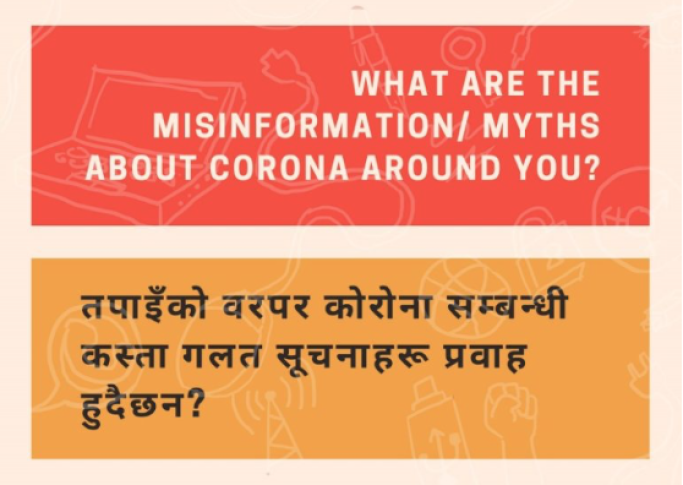
We are seeing abundant myths and misinformation about coronavirus, whether it be in Nepal or abroad. False information that is too good to be true and lacks evidence and research has caused mass hysteria among the general population. In Nepal, a lot of false claims, from the food habits of the Nepalese to getting acquainted with the ongoing dust pollution, have been discussed on various social media platforms. Our team asked different questions in our social media platforms in multiple languages (Bhojpuri, Bahing, English, Nepali and Nepal Bhasa) to raise curiosity among the public about misinformation around the COVID-19 pandemic. The questions included:
-
What are the misinformation/myths about the coronavirus around you?
-
What do you think about the reliability of the information on social media about the coronavirus (COVID-19) pandemic?
-
Do you use any methodology for fact checking the accuracy of information you get about the coronavirus pandemic?
-
What do you think are the harms of misinformation about the coronavirus pandemic?
Answers from the public are kept anonymous and their views are reflected for the purpose of this article.
Some of common myths and misinformation about coronavirus (COVID-19) in Nepal are myths around cultural and traditional values. The food that the Nepalese eat prevents us from getting coronavirus is a myth commonly heard in the country. Claims such as intake of certain food – turmeric, garlic, hot water with vinegar, chicken soup, spices, panchamrit (consisting of five ingredients: yogurt, milk, honey, sugar and ghee), raksi, gaumutra pani, chillies, and lastly, weed – will cure us from coronavirus are some of the home remedies that give the Nepalese a sense of false security from this pandemic. We probably hear this from our friends and family, and of course those never ending WhatsApp and Facebook forwards. The idea that if you consume certain kinds of food, you will not get the virus, is one of the most widely-known myths around coronavirus in Nepal.
Interestingly, some myths link to our previous claims of Pashupati Nath – one of the important religious temples of Lord Shiva – protecting Nepal from two consecutive earthquakes in 2015 and now protecting us from COVID-19 in the same way. With chanting prayers, offering dudh puri and other food items will protect us are also some religious and traditional myths around coronavirus in Nepal. These myths are deeply rooted with the feeling of ethnocentrism that makes people proud of their heritage and culture at times of crisis.
Continue reading at Body & Data.